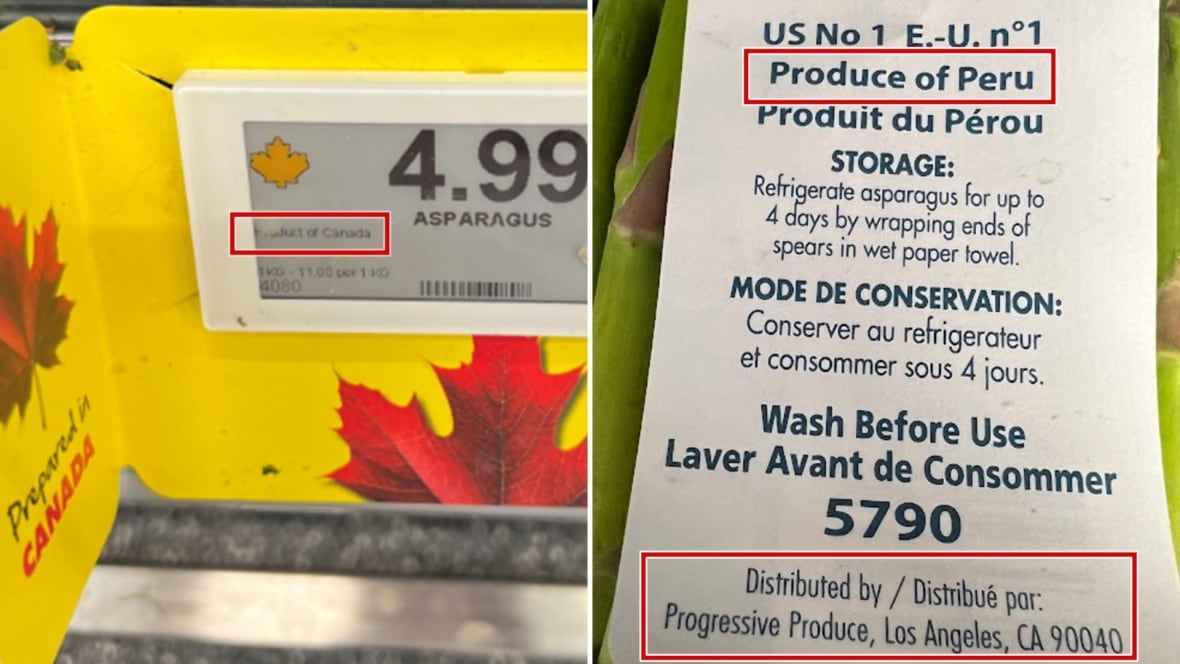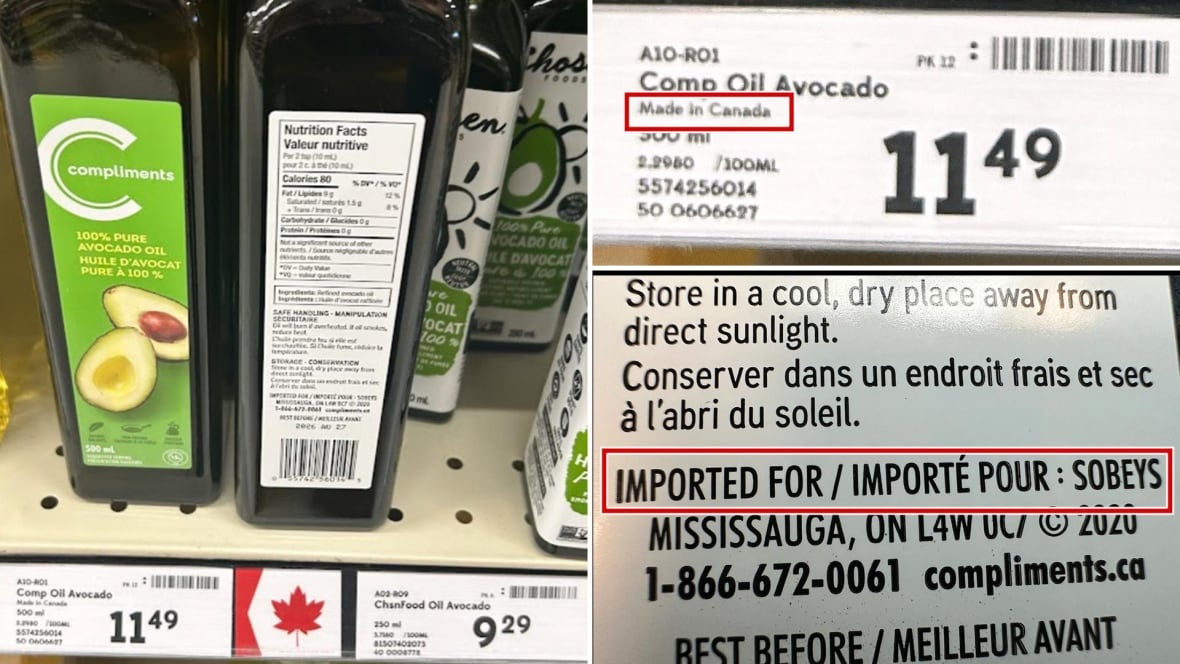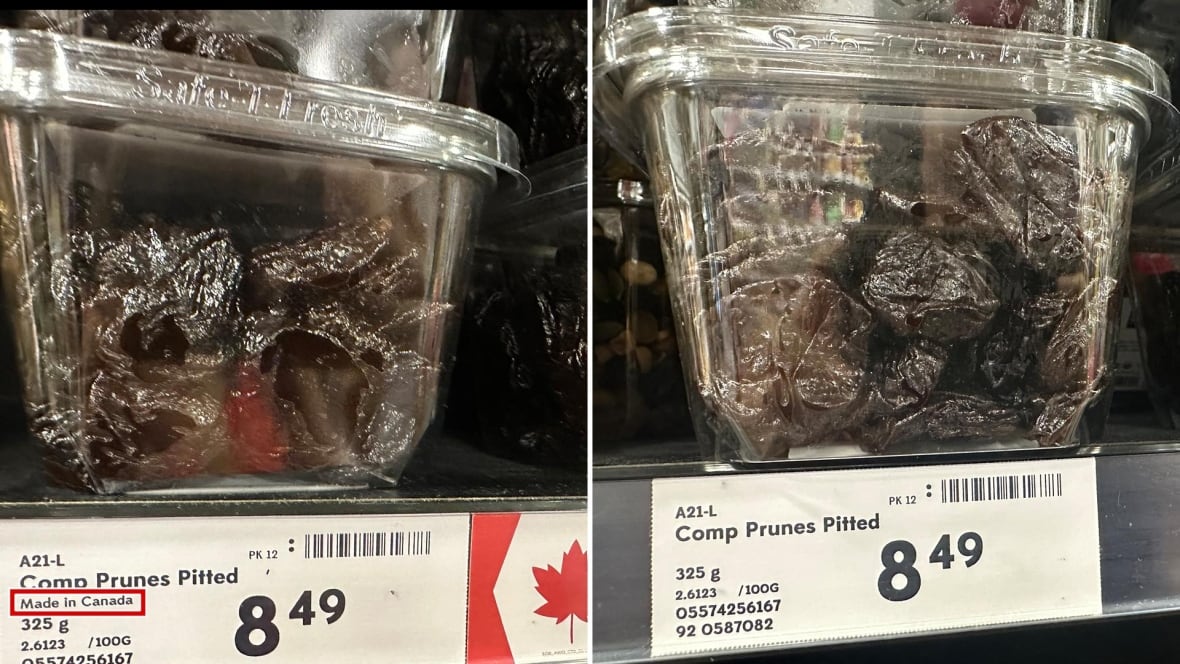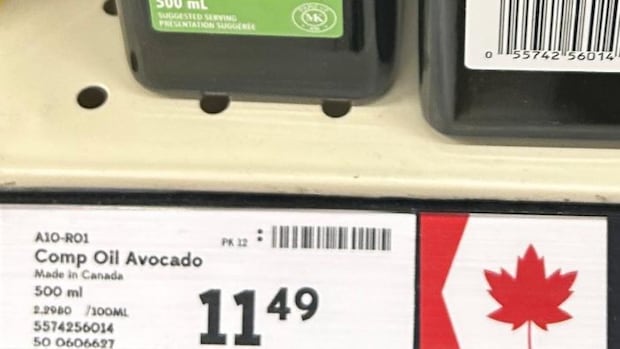The Canadian Food Inspection Agency (CFIA) has identified 12 cases where grocers engaged in “maple washing,” a practice where companies use Canadian branding, like the maple leaf, to promote imported food products.
The violations stemmed from complaints filed with the CFIA between February and May, and all but one involved national grocery chains, the agency told CBC News in an email.
The CFIA can impose fines of up to $15,000 per offence. No fines or other penalties were issued in the cases, including one that took four months to fully resolve.
The federal food regulator said it “took action” in each case and that, in all of them, the grocers fixed the problem.
The CFIA wouldn’t provide any grocer names, but CBC News confirmed that the prolonged case involved avocado oil bought at a Sobeys-owned grocery store near Edmonton.
Some shoppers committed to the Buy Canadian movement worry that if grocers face no repercussions, “maple washing” will persist.
“As consumers, we’re trying to do our part,” said Hamilton resident Brenda Nicholls. “I think the CFIA needs to step up and start levying fines, putting [on] some pressure, so that there will be some changes at the grocery store.”
In July, CBC News conducted its own investigation and uncovered more than a dozen cases of maple washing at a Toronto Sobeys, and one at a Loblaw-owned No Frills.
After Nicholls read CBC’s investigation, she has been carefully checking labels in stores, and has discovered misleading signage.
In late July, Nicholls found blackberries at her local Loblaw-owned Fortinos promoted with a red maple leaf symbol and a “Product of Canada” declaration. But the fine print on the packaging stated they were a “Product of U.S.A.”
The following month, she found asparagus at her local No Frills promoted with a red maple leaf plus “Prepared in Canada” and “Product of Canada” declarations. But the product’s tag said it was distributed by a U.S. company and “Produce of Peru.”
“The product of Canada label just seemed to be slapped arbitrarily, and it’s misleading,” said Nicholls.

She didn’t file a complaint with the CFIA. But in the case of the berries, Nicholls says she complained to Fortinos store staff. When nothing changed, she says she alerted the store owner, who fixed the error.
Marketing professor Tim Dewhirst says if grocers are found to be making repeated mistakes, they should face consequences.
“At a certain point, you say, ‘Enough is enough,'” said Dewhirst, a professor at the University of Guelph.
“If there aren’t any fines despite repeated violations, it becomes that the regulations have no teeth.”
Correct signage is the law
Loblaw didn’t comment on Nicholls’s findings and Sobeys didn’t comment on the avocado oil case. But both the grocers have told CBC News they strive for accurate country-of-origin signage, and noted that the task is challenging when dealing with mass inventory and constantly changing suppliers.
Both grocers — Canada’s largest — also said they’re continually making efforts to reduce errors.
Federal regulations state that food labels and in-store signage must be accurate and not misleading.
Many major grocery chains are trying to draw in ‘Buy Canadian’ conscious shoppers, but when CBC News took a closer look, it found misleading Canadian branding for several imported food products.
The CFIA says it has received 160 complaints related to country-of-origin claims for food so far this year, 41 per cent of which were filed between mid-July and August. Forty cases so far have been identified by the agency as being in violation of the rules.
CBC has details of 27 violations that stemmed from complaints received up until the end of May. Most involved national grocery chains. No fines were issued in any of the cases, all of which have now been resolved, said the agency.
In seven of the cases, in-store signage advertised produce as a “Product of Canada” — a claim that didn’t match the fine print. In another five cases, a maple leaf was used on in-store labelling to promote imported products like condiments and coffee.
“Product of Canada,” “Made in Canada” and “Prepared in Canada” labels each require differing degrees of Canadian content, which can’t include the packaging process, the CFIA told CBC News.
The promotional use of the maple leaf symbol must be “truthful and not misleading,” added the agency.
The avocado oil case
CBC News identified the grocer in one CFIA case because the complainant contacted CBC and provided documentation.
Sheila Young, who lives just outside Edmonton, complained to the agency in April about Sobeys’ house brand Compliments avocado oil purchased at her local Sobeys-owned Safeway.
In-store signage for the oil included a red maple leaf and the label “Made in Canada.” But the small print on the bottle revealed the product was imported.

“It is maple washing and that shouldn’t be done,” said Young. “I’m retired. I have time to put on my reading glasses and read all the labels, and there are many people that don’t.”
In July, three months after Young filed her complaint with the CFIA, CBC News’ investigation found similar cases: more than a dozen imported Compliments products, including salad dressing, prunes and raw nuts, promoted in a Toronto Sobeys store with the same maple leaf symbol and, in several cases, a “Made in Canada” declaration.
Shortly after CBC’s investigative report, Sobeys removed its Canadian branding from the imported Compliments products featured in the story.

On Friday, four months after the CFIA started looking into Young’s avocado oil complaint, the agency reported the matter had been resolved.
The CFIA said the misleading signage for the oil had been removed back in April but that it took extra time to “determine if further corrective actions were needed to avoid a similar situation in the future.”
CFIA responds
Young was happy to learn her case was finally closed. However, she says Sobeys should be penalized, as she believes the company was responsible for the lengthy resolution process. Neither she nor CBC News know the exact details behind the delay.
“I’m disappointed that it took four months,” she said. “It should be something that can be cleared up within a few weeks.”
Young points out that the Buy Canadian movement has been going strong now for seven months.
“Enough time has passed,” she said. “[Grocers] should have it together.”
The CFIA said it “takes food mislabelling seriously” and selects appropriate enforcement action “based on a range of considerations” including risk factors, the company’s compliance history and its “responsiveness to resolving the issue.”
What can shoppers do?
Dewhirst suggests concerned Canadians scrutinize all labels.
“The onus shouldn’t be left only to the shoppers,” he said. “But certainly, just because of the number of instances that we’ve seen with mislabelling, I would certainly encourage people to … really check carefully the labels [and] not to make an assumption just because they see a maple leaf.”
As for Nicholls, after her recent experiences with mislabelling, she says she mainly shops at independent stores that specialize in locally produced food.
“It’s up to the consumer to speak with their wallet.”








